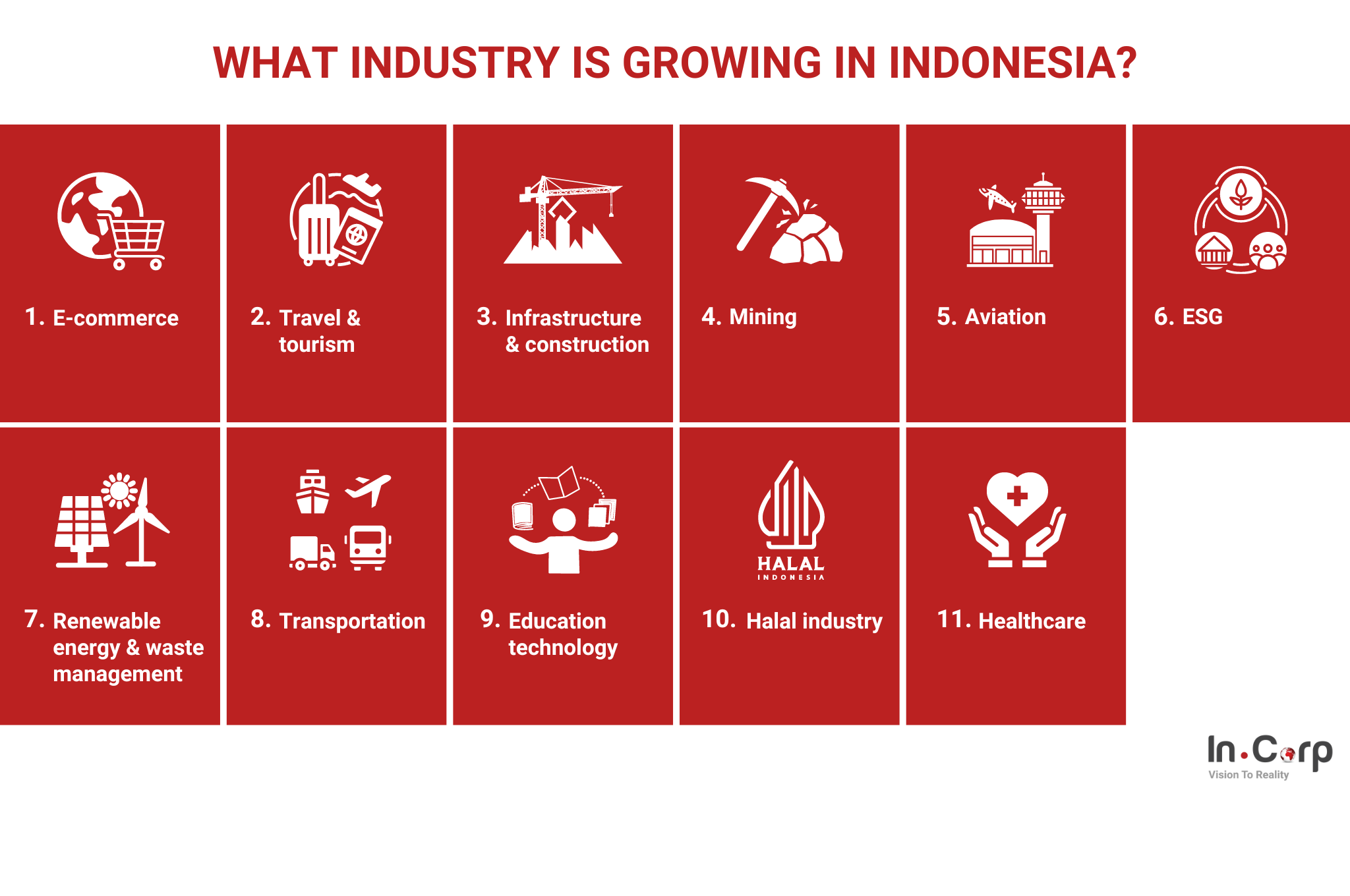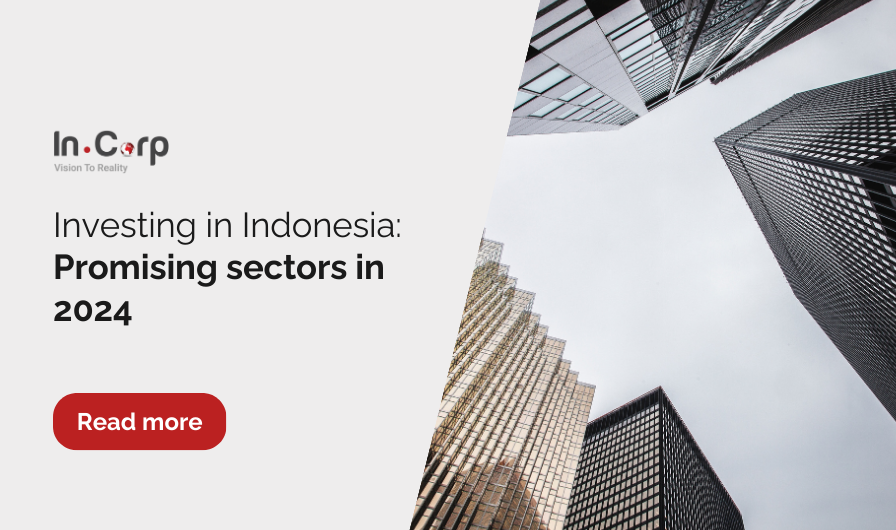Indonesia has been a popular destination for investors. Its young and vibrant population, growing middle class, abundant natural resources, and recent government initiatives have been pushed to enhance the business environment. These factors make investing in Indonesia an exciting opportunity with immense potential in 2024.
Profitable business concepts in Indonesia by 2024
Indonesia’s economy is projected to grow by 5.2% in 2024, which is great news for the country’s development. This growth will be supported by increased domestic consumption and ongoing infrastructure improvements, creating a conducive environment for investment.
Additionally, the Core Consumer Price Index is expected to average 2.1% year on year, indicating a stable economic environment. Investment in Indonesia is also anticipated to grow by 5.7% (yoy) in 2024, higher than the estimated 4.6% (yoy) in 2023, portraying a positive outlook for the future.
Furthermore, private consumption is expected to increase by 5.6% (yoy) in 2024, while government consumption is projected to rise to 6.1% (yoy) in 2024, indicating a significant boost to the overall economy.
Read more: Positive Investment List improves investment in Indonesia
What industry is growing in Indonesia?

Indonesia’s thriving economy presents many promising business opportunities for local and international investors. Several highly profitable industries are worth considering if you’re looking to invest. Let’s take a closer look at them.
1. E-commerce
Indonesia’s booming e-commerce market is predicted to reach a GMV of USD 160 billion by 2030, offering a lucrative investment potential. The e-commerce payments are projected to hit USD 53.8 billion by 2025, driven by rising internet use and social commerce.
2. Travel and tourism
Indonesia’s thriving travel and tourism industry contributes nearly 5% to the GDP. The industry is expected to create over 5 million jobs between 2023 and 2033, with Bali as a top destination experiencing a 30% year-over-year increase in foreign tourist arrivals in November 2023.
3. Infrastructure and construction
Investors can look forward to significant opportunities in the near future. The government’s commitment to infrastructure development is evident as it plans to invest more than USD 400 billion between 2020 and 2024. Public-private partnerships (PPPs) also attract global investment, contributing to the country’s infrastructure growth.
4. Mining
Indonesia’s globally significant mining sector produces coal, gold, tin, copper, and nickel. The government aims to boost the mining sector by banning raw material exports, increasing product value, creating jobs, and improving profit margins.
5. Aviation
Indonesia’s aviation industry has grown remarkably, providing lucrative foreign investment opportunities. With a projected 6th largest air transport market ranking by 2034, the country’s 17,000 islands are increasingly accessible to travelers.
To meet the soaring demand for air travel, there is a pressing need for infrastructure development, which offers excellent prospects for investment in new airports and improvements to existing ones.
6. ESG
Indonesian companies have a great opportunity to improve their financial prospects by enhancing their ESG initiatives in 2024. By focusing on ESG factors, companies can secure significant funding, lower their interest rates, and improve brand recognition. This helps attract loyal employees and customers and builds a sustainable business model.
7. Renewable energy and waste management
Indonesia’s potential in renewable energy and waste management, with a projected annual investment of USD 10 billion by 2030, aligns with the shift from conventional energy sources like coal. Innovative startups addressing plastic waste challenges offer investment potential.
8. Transportation
Indonesia’s unique geography, with its 17,000 islands, presents challenges and opportunities for innovative transportation solutions. The growing demand for electric vehicles, with a target of 21 million on the road by 2025 and backed by the proposed USD 2 billion EV fund from the government, offers an attractive investment opportunity.
9. Education technology
Indonesia’s education technology sector, addressing a significant gap in upper secondary qualifications, offers a niche market. By 2030, projections show that 113 million Indonesians will require professional retraining, creating opportunities for entrepreneurs in self-learning, tutoring, and online courses.
10. Halal industry
With Indonesia’s predominantly Muslim population, the demand for halal products and services creates a significant market. Indonesia’s expertise in Islamic banking, fintech, and halal goods manufacturing positions it to become a leader in the halal industry.
11. Healthcare
Universal healthcare was implemented in 2014 and covers 86% of Indonesia’s population, making quality healthcare a priority. Despite challenges, the COVID-19 pandemic has led to an increase in telemedicine, creating investment opportunities.
Economic challenges in 2024
In order to ensure continued economic growth, Indonesia may need to address specific challenges that could arise in 2024.
1. Global level
- Indonesia’s economy may be affected by geopolitical conflicts such as the Israel-Palestine and Russia-Ukraine wars. These conditions could lead to countries becoming more inward-looking or prioritizing domestic interests—a decline in global trade volume, which could hamper worldwide economic growth, may be the consequence.
- The economic slowdown in China, one of Indonesia’s major trading partners, and even within ASEAN, will affect Indonesia’s export performance next year.
- The ongoing global inflation, yet to return to pre-pandemic levels, implies that global benchmark interest rates will persist longer. As a result, global liquidity will remain tight, keeping the cost of funds high.
2. Domestic level
- The anticipated contraction of export performance in 2024 is triggered by the global economic slowdown, leading to a decline in export demand.
- There is potential for a sustained depreciation of the exchange rate. Bank Indonesia foresees the possibility of the rupiah weakening in 2024. The likely average exchange rate for 2024 is projected at IDR 15,510 per US dollar, which is lower than the 2023 forecast of IDR 15,280 per US dollar.
- The 2024 elections pose a risk to the national economy. While campaign activities may boost consumer consumption, political uncertainty may lead investors to adopt a wait-and-see approach, impacting market stability.
Reasons why you should invest in Indonesia
Indonesia’s appeal for investors remains strong in 2024, but like any investment landscape, it’s essential to consider the latest updates:
1. Resilient economic growth
Despite global uncertainties, Indonesia’s GDP is projected to grow 5-6% in 2024, driven by robust domestic consumption and increasing exports. This growth surpasses many other emerging economies.
2. Booming middle-class
Indonesia boasts the world’s 4th largest population and a rapidly expanding middle class, creating a massive consumer market for various sectors.
3. Business reforms
The government continues to ease foreign investment regulations and streamline bureaucratic processes, making it easier to do business.
4. Strategic location
In Southeast Asia, Indonesia offers access to a vast regional market and a gateway to other Asian economies.
5. Abundant natural resources
Rich in minerals, oil, gas, and agricultural resources, Indonesia presents opportunities for resource-based industries.
6. Competitive labor costs
Compared to some neighboring countries, Indonesia offers lower labor costs, attracting manufacturers and other labor-intensive industries.
Unlock Indonesia’s potential with InCorp
While Indonesia’s 2024 economy navigates specific challenges, its robust growth trajectory and vast market opportunities remain undeniable. To capitalize on this fertile ground, InCorp Indonesia is your trusted partner, paving the way for a seamless and efficient business entry.
Unleash our unparalleled expertise:
- Effortless company registration: We navigate the complexities, freeing you to focus on your vision.
- Complete licensing support: No stone unturned, no permit missed – we secure your operational foundation.
- Investor KITAS facilitation: Smooth immigration for you and your key personnel, ensuring uninterrupted progress.
Click the button below to unlock your ventures’ potential and succeed in this dynamic and promising landscape.
Get in touch with us.
What you'll get
A prompt response to your inquiry
Knowledge for doing business from local experts
Ongoing support for your business
Disclaimer
The information is provided by PT. Cekindo Business International (“InCorp Indonesia/ we”) for general purpose only and we make no representations or warranties of any kind.
We do not act as an authorized government or non-government provider for official documents and services, which is issued by the Government of the Republic of Indonesia or its appointed officials. We do not promote any official government document or services of the Government of the Republic of Indonesia, including but not limited to, business identifiers, health and welfare assistance programs and benefits, unclaimed tax rebate, electronic travel visa and authorization, passports in this website.



